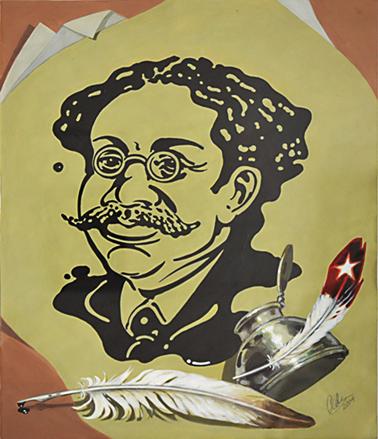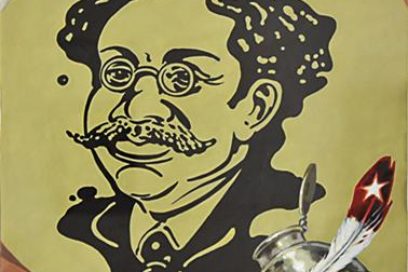
The news was published by Marti in Patria Newspaper on June 11, 1892: two Cubans whose fathers were originally European have taken by the hand “the mulatto brother, the nobleman Juan Gualberto Gomez to the distinguished house where there are the shrewdest and most helpful Cuban sons,” it was the Economic Society of Cuban Friends.
And added: “It is simple the value of the new partner of the Economic… (…) He loves Cuba with that passion of life and death, and that heroic tipsy he will love it in these days of feat from who really loves it. He has the determination of the journalist, the energy of the organizer, and the constant view of a statesman.”
Our National Hero knew him very well. Their friendship started by the end of 1878 at Nicolas Azcarete’s lawyer office where Jose Marti, as he could not present his lawyer’s degree in Spain, he had to accept to work as assistance. They later kept on meeting at Miguel Viondi’s office.
Jual Gualberto’s origin could not be humbler. His parents were domestic slaves and were able to save the necessary money so their baby to be born would be able to be free. He was born on June 12, 1854 at Vellocino Sugar Refinery in Sabanilla del Encomendador, Matanzas province.
When he was 10, his parented already freed, they moved to Havana where, as Juan Gualberto said, he learned all that was possible for black people.” When he was 15 his parent saved the money to send him to France to get a trade but the owner of the factory realized he had a great capacity to learn more complex things and registered him at an engineering school. In 1875, they could not pay his studies anymore, but Juan Gualberto decided to stay in Paris working and that was how he started as journalist.
He was a student when he met in Paris with the patriots Francisco Vicente Aguilera and General Manuel de Quesada who were collecting funds among the revolutionary Cubans whom he worked as interpreter for them. He considered the first one as his spiritual father in relation to patriotism.”
These were his thoughts when he returned to Cuba after Zanjon’s Pact, so it was natural the friendship between he and Marti for the coincidence in opinions on the need of independence of their Homeland.
Besides devoting his life to conspiracy, during this period, Juan Gualberto fully spent his life, according to him, “to the defense of the mixed races; the abolition of slavery and the equality of rights.”
He founded La Fraternidad Newspaper and turned into “a spokesman of his race when it had no defenders.”
Marti and Juan Gualberto were involved in the so called Guerra Chiquita (Short War) that started by the end 1879 and they were deported to Spain. Juan Gualberto was sent to Ceuta. They first imprisoned him at Hacho Castle, but thanks to friends he was released from prison but forced to stay in the peninsula. He worked for years in several editorials as correspondent of La Lucha newspaper. He was editor-in-chief from El
Abolicionista, a newspaper with the same name of the society; director of La Tribuna, a media devoted to the liberation doctrines and the colonial reforms, editor of the newspapers El Progreso and El Pueblo, among others, and for years, he attended the Deputies’ Congress where he met with personalities from the Spanish policy who respected his separatist position.
When he returned to Cuba in 1890 he kept on spreading his ideas in favor to independence and combat against racial prejudices, and for the defense of the black and mixed race people’s rights. He got back La Fraternidad newspaper again and he later published The Equality, in the first of them he wrote an article titled Why we are Separatists that sent him to prison. His sentence had lack of solid legal evidences that when they were sent to the Supreme Court of Spain, the defense lawyer of the Cuban managed to declare legal the separatist propaganda, and that, not only helped his freedom but also the multiplication of his newspaper that spread those ideas.
When Marti founded the Cuban Revolutionary Party in 1892, he got in contact with his mulatto brother and they established an intense weekly correspondence. He soon became the key man of the revolutionary movement, whose hands had the instructions for the uprising of February 24, 1895.
Days before, there was a curious incident that could have had disastrous consequences for the cause. Juan Gualberto was travelling in a local train in Havana, on San Rafael Street, when the Spanish Colonel Santocides got in and sat beside him. He knew him. As greeting he patted him on his legs and asked Juan Gualberto: “When are we going to rise up?”, and added, “because there are some comments of an uprising… it seems there is going to be a war,” Juan Gualberto, alarmed but without perturbed answered he knew nothing about it and the officer responded: “I do not believe what it is said either,” but the journalist thought that as the officer was saying so, he was informed on all he was doing, but he really was not.
He participated in the failed uprising of Ibarra, some miserable people tried to present this event as an insulting page of life, and he answered it was an action from which they feel proud.
He was arrested again and taken to Morro Castle with several causes for rebellion and he was about to be sentenced to death. But he was once again sent to Ceuta and later to a prison in Valencia where he spent the two first years of the war until it was established the Autonomous Government in Cuba and he was released.
He wanted to return to the Homeland to fight for the liberation of his country. He moved to France and later to the United States (U.S.) where Estrada Palma who succeeded Marti leading the Cuban Revolutionary Party asked him for help to collect funds for the revolution among the emigrants.
When the war against Spain ended, Juan Gualberto was about to have a great battle. As he was elected member of the Constituent Convention, in charged to write the first Constitution of the future Cuban Republic, he turned into paladin of the confrontation to the Platt Amendment, a convenient substitute of the annexation.
He presented several arguments against that monster where he denounced he placed Cuba “in the condition of vassal people” when the US Congress exceeded its power to govern a territory is not part of the Union. If accepted, we will “hand in the key of our house so they can get in any time,” and will only live, the Cuban governments that will have the support and benevolence of the US, what reality will become in the Republic.
Although Convention members passed the Amendment to prevent occupation will be indefinitely, Juan Gualberto kept his vote against it. On this issue, Officer Leonardo Wood sent a letter to President Roosevelt: “There are eight from the 31 members of the Convention who are against the Amendment. They are denigrated people (He later changed the word by agitators) of the Convention, leaded by a black man named Juan Gualberto Gomez, a man with disgusting reputation, either in the moral or political matter.”
Such expressions of hate from the enemy were the best demonstration that the honorable and virile behavior of that “black man” had shown their real maneuver plain and single. And it was there in the Republic where Juan Guanberto Gomez was still the representative of the revolutionary he used to be.
That is why, when he had to receive the Great Cross Carlos Manuel de Cespedes from the hands of the dictator Gerardo Machado, the highest decoration from Cuba by then, he said and surprised everybody: “I am Juan Gualberto Gomez with or without Cross.”
That was Marti’s mulatto brother, who in his last letter before leaving to the Cuban fields wrote: “Do you see? Will I write you again? I feel so connected to you that I get quiet. We will conquer all the justice.”
Acerca del autor
Graduada de Periodismo en 1974 y Master en Ciencias Políticas de
enfoque Sur, Al graduarse pasó a atender temas históricos e
ideológicos y viajó a varios de los antiguos países socialistas. Al
pasar al periódico Trabajadores, escribió para el Suplemento de
salud durante varios años y realizó la cobertura del segundo
contingente de la brigada médica en Guatemala. Posteriormente fue
jefa de la edición digital y subdirectora editorial hasta mayo de 2025
que se jubiló y se recontrató en la publicación. En el transcurso de
su ejercicio profesional Ha ganado premios en concursos
periodísticos y de humorismo.



